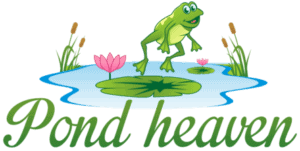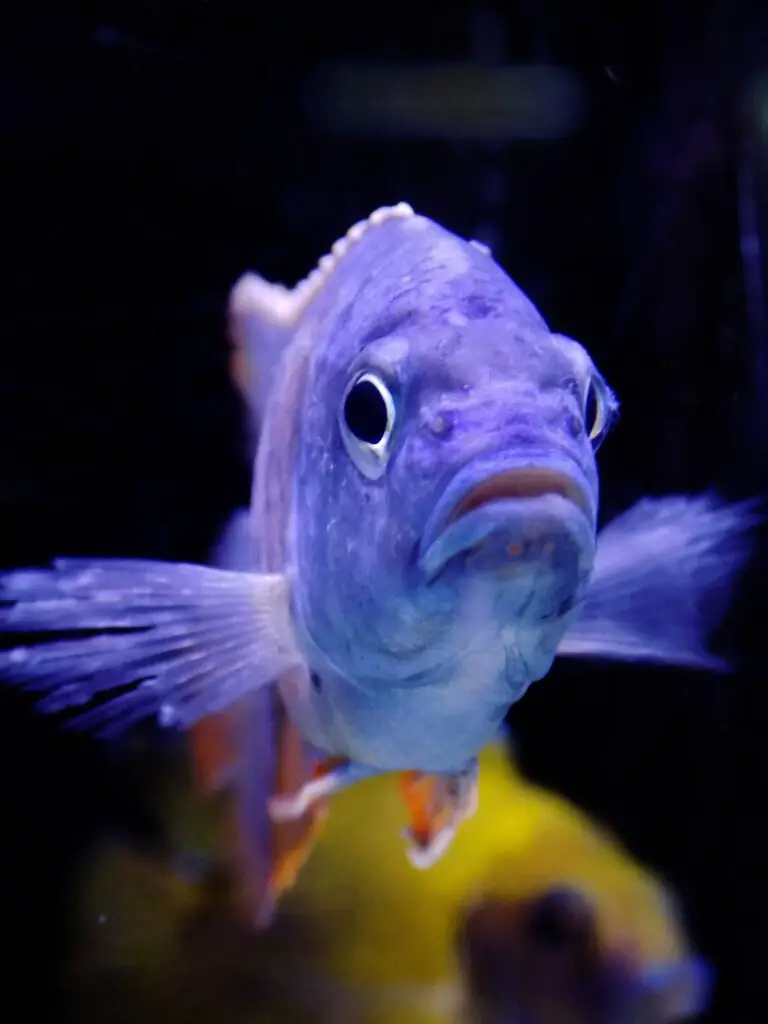
Koi fish are known for their bright colors, distinct patterns, and large size, which make them popular fish. Whether you have kept koi fish for years or are just starting out, you will know the type and quality of food they eat will determine their health and happiness. Some people suggest supplementing their koi feed with cichlid food, but you should ask yourself, can koi eat cichlid food?
Koi fish should not eat cichlid food. The dietary requirements of koi and cichlid are different. In the wild, koi eat mostly plant matter and small invertebrates, while cichlids eat other fish. Their respective foods’ ingredients and nutritional makeup are different and should not be interchanged.
While koi and cichlids are both freshwater fish, they eat different foods in the wild and have different dietary requirements. Because of this, the food produced for each species is made from different ingredients. While koi fish can survive on cichlid food, they will not thrive on it and may suffer ill health over the long term.
Pro Tip: If you’re tired of wasting money and making costly mistakes on the koi-keeping hobby or are thinking about buying koi fish but don’t know where to start, I strongly suggest you check out this ebook. I recently read this ebook, and it contains SO much useful information, such as:
- 3 proven steps to identify koi fish diseases
- WARNING: 3 things you should NEVER do when it comes to caring for koi
- When to seek professional help when it comes to looking after your koi
Can Koi Eat Cichlid Food?
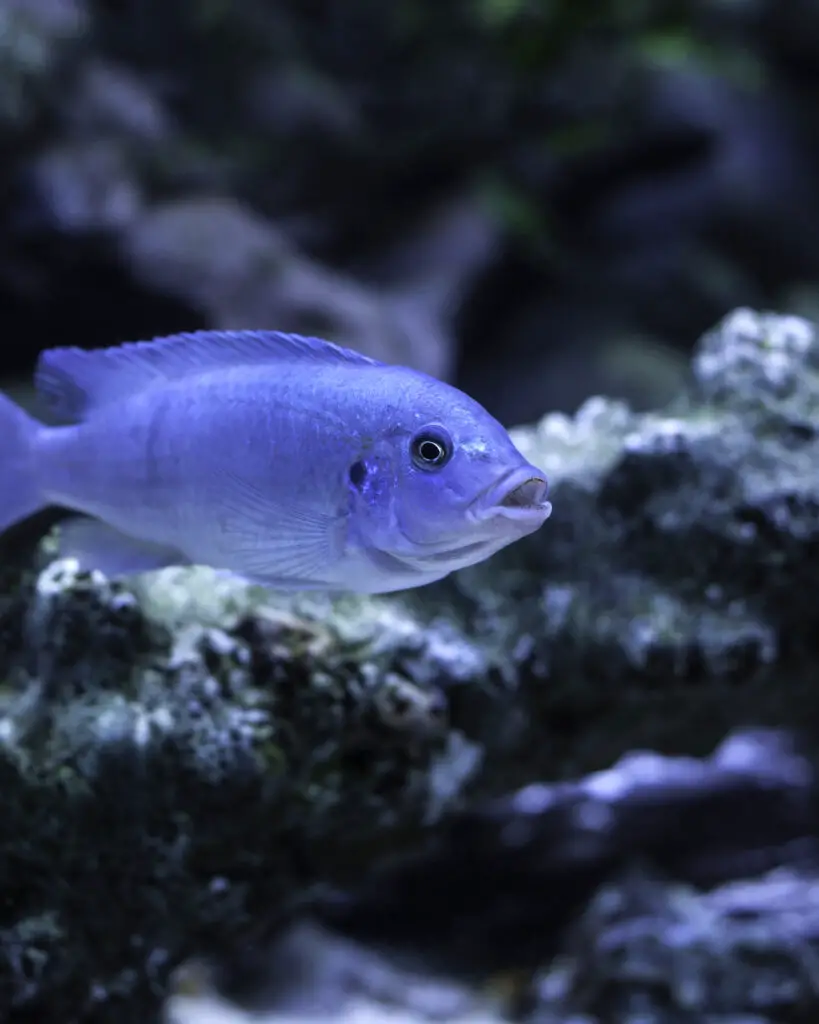
Because of their unique nutritional needs, choosing the right food for each species is necessary. For convenience, some fish food is designed to be suitable for multiple fish species, but this is not the case with food designed for koi and cichlids. Even so, checking food ingredients and nutritional information before feeding your fish is always best.
Koi are a type of carp that originates from Japan. In the wild, they are omnivorous and eat mostly plant matter and small invertebrates from the pond floor. Koi will usually eat anything they can get in their mouth.
Cichlid fish are found naturally in South America, Asia, and Africa. They are popular because of their shape, unique colors, and behavior. Cichlids mostly eat other fish, making their typical diet high in protein and low in plant matter.
Because of koi’s natural eating habits, they will likely eat cichlid food if given to them. Still, the nutritional makeup is not as balanced for them as a recommended diet over the short or long term.
Take the following into consideration before giving your koi cichlid food:
- Cichlid food usually has a high protein content. If your koi are not used to this higher protein content, the cichlid food may cause digestive problems, and long-term use may result in organ damage.
- Koi food has a higher plant matter content, which the fish will easily digest and absorb.
- Cichlid foods are usually fortified with additional vitamins and minerals, which are unnecessary for koi. These will need to be processed out by the koi, which may cause digestive issues over the long term.
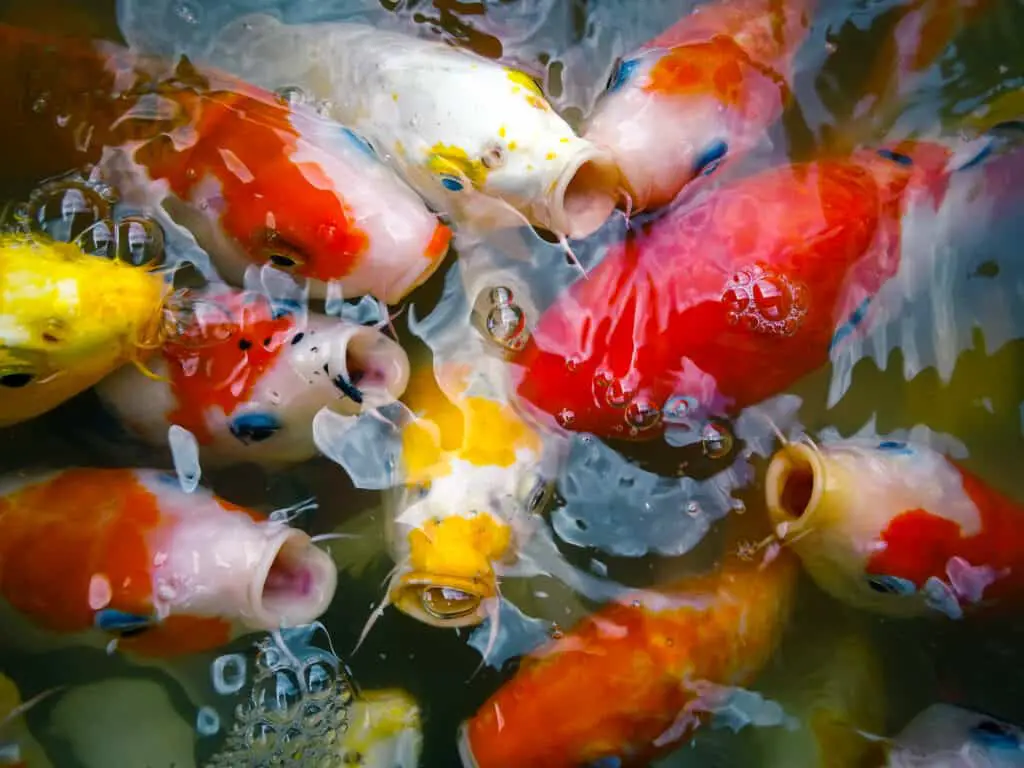
Always check the ingredients of your fish food to ensure it meets the dietary requirements of your fish. It may be helpful to consult a veterinarian or other fish professional for advice on the best food to feed your koi.
Can Koi Live With Cichlids?
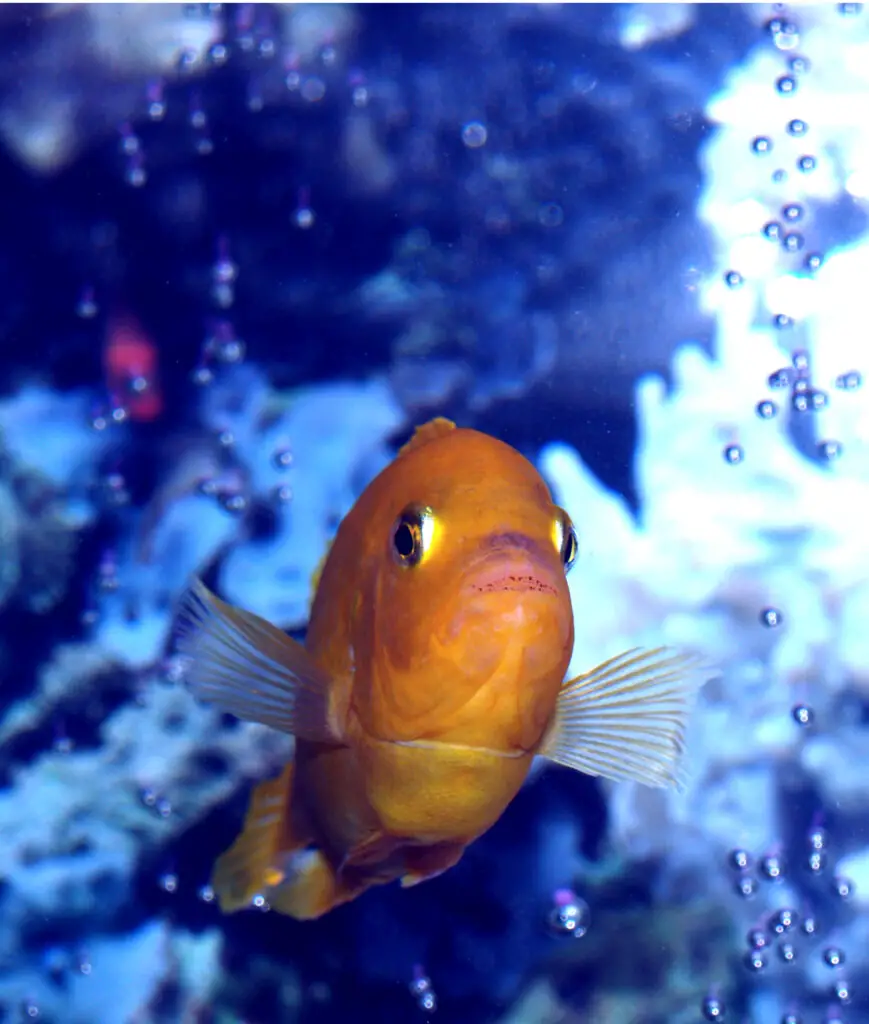
Koi and cichlid fish share some traits, but they are different fish altogether. Their differing behavior, natural aggression levels, and territorial nature do not make them suitable to keep together. It is not recommended that koi and cichlid fish live together.
Cichlid fish are naturally more aggressive and territorial. They will outcompete koi for food in a pond or tank, leading to stress for the koi fish and possibly elevated levels of aggression from the koi in response to the stress.
In some cases, especially in smaller spaces, cichlids will attack smaller koi fish and may cause them injury.
The pond or tank’s stability should also be considered, as koi require a more stable environment than cichlids.
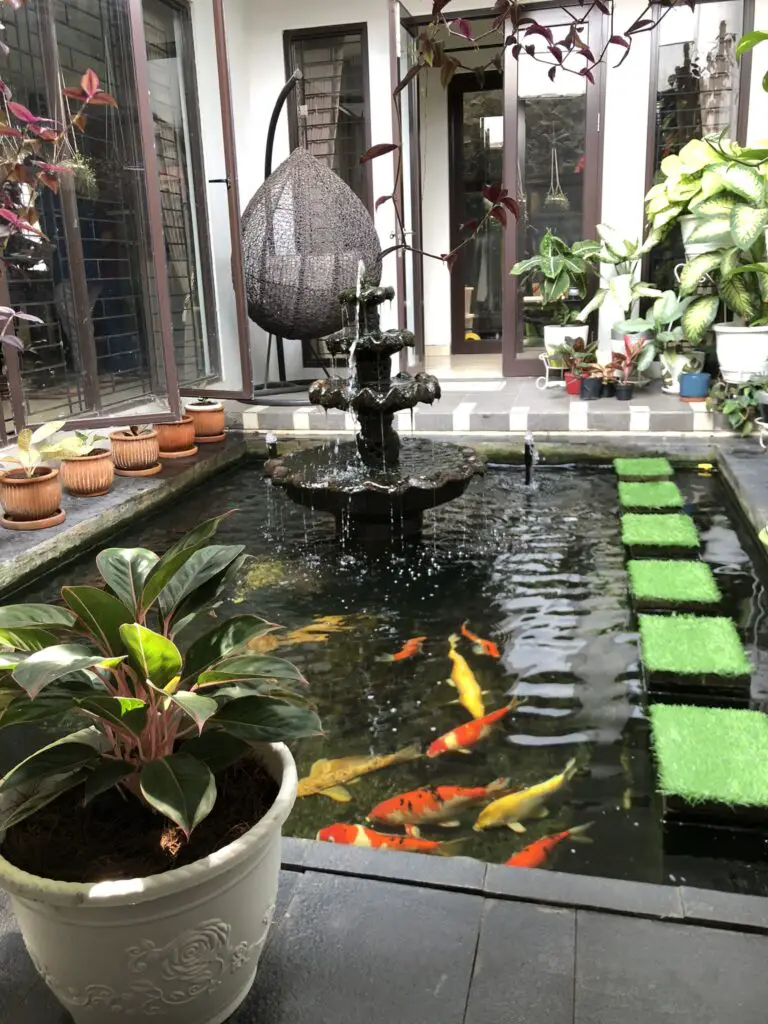
Koi Fish Nutritional Requirements
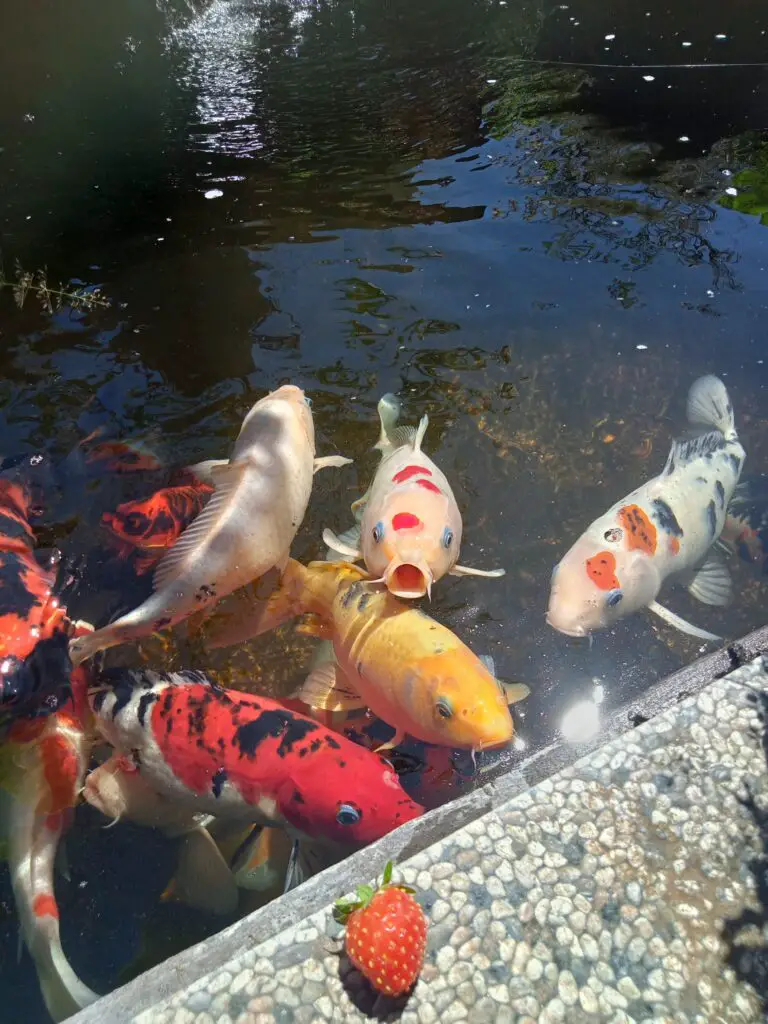
As koi fish are foragers, they require a balanced and rounded diet with a feeding scheme of up to four times a day. Check the content of the food you feed your koi to ensure it meets their dietary requirements. A balanced diet for your fish should have the following:
- Only 3-9% fat content: Unless an adult fish is ill, it will not require a high-fat content in its diet. Three to five percent will suffice. Young fish may need a higher fat content while they are growing. Five to nine percent will be best.
- 32-36% Protein content: As koi are foragers, they eat small insects and other protein sources in natural habitats. A one-third protein content will be most beneficial in your koi’s diet. A higher protein content will not benefit your koi.
- Low Phosphorous content: A high phosphorous content in your koi food will result in a high phosphorous content entering the water in your pond or tank. These elevated levels promote algae growth, resulting in a dirty tank and a higher chance of skin irritation or disease for the koi.
- Small amounts of vitamins and minerals: Koi food should also include small amounts of calcium and vitamins A, C, D, E, and K.
A balanced fish food for your koi should include a primary fish-based ingredient to provide the protein in the food and a secondary carbohydrate ingredient. The fish-based ingredient is typically fish, squid, herring, shrimp, or anchovy meal with a secondary wheat germ, soybean meal, or corn gluten added to the food.
What Foods Can You Feed Koi As A Treat?
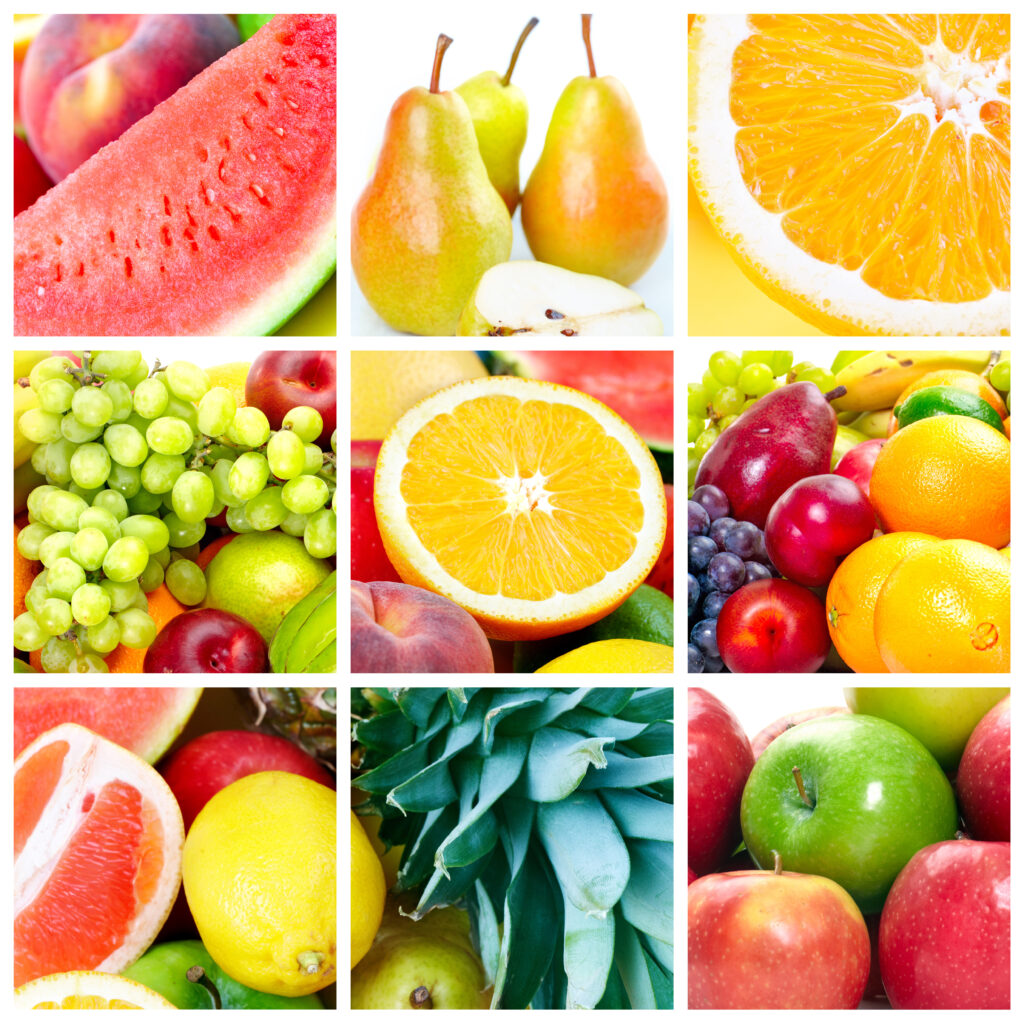
Because koi are omnivorous, they can be fed a variety of treats as a way of supplementing their diet. It is also exciting to see koi come to the pond’s surface to eat the treats, allowing you to see the patterns and colors as they do so.
As with giving treats to any pet or animal, these should be given in moderation, as overfeeding can lead to obesity or health problems. That said, if you give your koi the right treats, you can also supplement their dietary needs in a controlled and healthy way.
Koi love these treats thrown into the pond for them to nibble on:
| Treat | How to prepare the treat | Supplemental benefits |
| Peas, lettuce, cauliflower, broccoli | Raw vegetables are too hard for koi to eat. Cook the vegetables and slice or dice them for the koi to nibble on. | Vegetables are a very good source of fiber and vitamins. |
| Watermelon, melon, grapes, strawberries | Cut the fruit into small chunks or small thin slices. Small enough for the koi to fit the whole piece in their mouth. | Fruits are high in vitamins |
| Pasta, rice, oatmeal | Cook these without salt until they are soft. Uncooked pasta, rice, and oatmeal will expand in the koi’s stomachs, which will cause them discomfort. | Additional fats. Note: these should be fed as treats |
| Earthworms, cooked and peeled shrimps | Koi love earthworms, but these worms are not often found in a pond, so throwing a few in is a treat. | Protein and essential fatty acids |
Conclusion
Koi are vibrant and fun fish to keep, but like all animals cared for by people, they need to be fed correctly to be happy and healthy. Owners should avoid feeding koi cichlid food as it is designed to meet different nutritional needs from what koi require. While they can eat it, avoiding it for healthy koi would be best.
Resources:
https://smallfishtank.com/can-cichlids-live-with-koi-together/
https://premierpond.com/feed-koi-fish-2/
https://koistory.com/koi-fish-feeding
https://a-z-animals.com/blog/what-do-koi-fish-eat-8-key-foods-in-their-diet/
